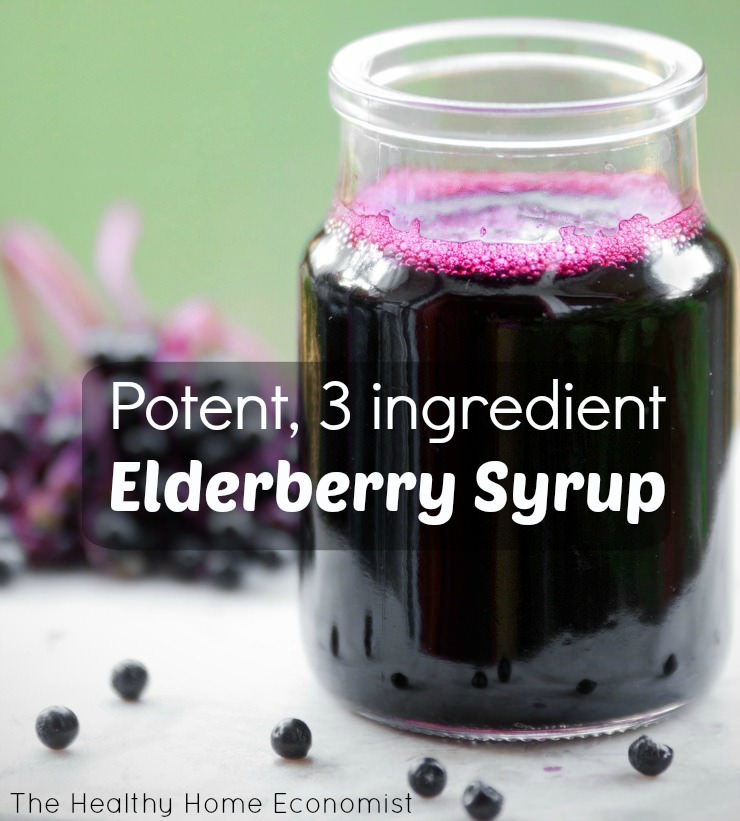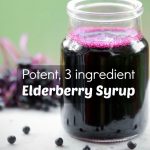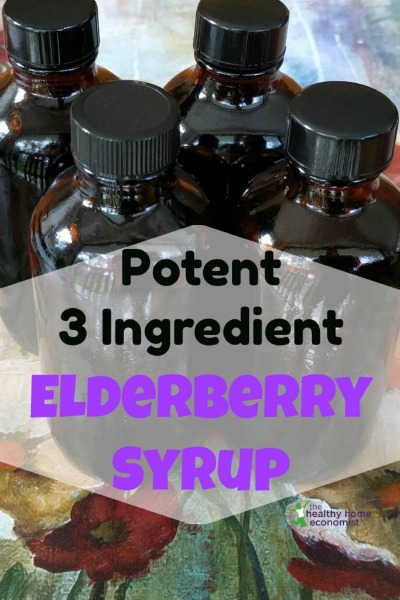
When my children were young and had bad coughs, I relied heavily on elderberry syrup to reduce symptoms.
Small doses throughout the day kept mucous to a minimum which reduced the severity and frequency of coughing spells at night. Unlike some home remedies, this beneficial cold and flu supplement tastes amazing, so they always asked for it. This made my job much easier on busy days.
I never realized until that particular time that this common, nondescript little berry, particularly when concentrated into elderberry syrup, packed such a powerful punch when it comes to managing cough symptoms. The fact is, elderberry in many different forms has been used in folk medicine for centuries to treat flu, colds, and sinusitis as well as coughs.
When I was first introduced to this remedy, I purchased the syrup from our family chiropractor. It was pricey, but definitely worth it especially for my youngest child, who was only 15 months at the time.
I have since learned that it is extremely easy and cost-effective to make elderberry syrup yourself.
Before we launch into a recipe, let’s overview the benefits of elderberry as outlined in the scientific literature.
Elderberry Syrup Benefits in Scientific Literature
Elderberry syrup is not just good for when you are sick either. It is a highly effective preventative too as it is loaded with antioxidants, Vitamin C and immune-supporting minerals.
Scientific research is supportive of the use of elderberries for illness. In one study, elderberry extract inhibited several strains of influenza and reduced symptoms. Another study found that elderberry syrup flavonoids were effective against the H1N1 (Swine Flu) virus.
In the most compelling study, a randomized trial of 60 patients aged 18-54 suffering from flu symptoms for 48 hours or less received 15 ml (3 teaspoons) of elderberry syrup or a placebo 4x per day for five days. Researchers observed that “Symptoms were relieved on average 4 days earlier and the use of rescue medication was significantly less in those receiving elderberry extract compared with placebo”.
Besides being effective at preventing and reducing symptoms, elderberry syrup also has highly practical applications as well. It is delicious on pancakes and waffles or drizzled on homemade ice cream as a sore throat remedy when something cold is especially welcome.
In addition, elderberry syrup can help get less appealing whole food supplements like cod liver oil down the hatch for your little ones.
Tip: A teaspoon of elderberry syrup is a fantastic chaser after the daily dose of cod liver oil. If your kids dislike the taste of cod liver oil, a spoon of elderberry syrup afterward will placate them. It is a tasty treat that will quickly eliminate any aftertaste and help prevent fishy burps.
I would recommend making a batch of this elderberry syrup and having on hand all year long. It is helpful anytime colds, flu and coughs are making the rounds in your household. It is a great supplement to use at the start of the school year too!
Suggested Dosage
A single teaspoon of homemade elderberry syrup once or twice a day is sufficient as a preventative measure. If illness strikes, use more as necessary, with up to 3 teaspoons, 4x per day as used in the randomized study described above.
Please note that because of its potency, homemade elderberry syrup can bring on loose stools in some children and adults. This is not a problem and actually part of the detoxification and healing process of the elderberries. If the stools become too loose for your comfort level, back off the dosage a bit.
Babies and Children Under Age 1
For young children, half the maximum dosage is recommended. In addition, replace the raw honey in the recipe below with date syrup. This traditional whole sweetener is highly nutritious, is safe for very young children and possesses anti-bacterial properties similar to raw honey according to recent research.
This recipe for elderberry jello shots is a great way for little ones on solid food to take their daily dose.
Is Elderberry Safe for Pregnant and Breastfeeding Women?
Surveys indicate that many women use elderberry syrup during pregnancy and breastfeeding. However, there is currently not enough scientific evidence one way or the other to conclusively recommend it.
The journal Frontiers in Pharmacology suggests that “due to lack of evidence of efficacy and safety, health care personnel should not advice (sic) pregnant women to use echinacea or elderberry against upper respiratory tract infection.”
How to Make Elderberry Syrup
The simple elderberry syrup recipe below contains only 3 ingredients: elderberries, raw honey and water. While any type of raw honey is fine for this recipe, manuka honey that is UMF certified 10+ is the most potent type. A single batch is enough to take your family through an entire cold and flu season.
Hint: start giving it to your children a few days before school starts! This recipe is BOTH anti-viral and anti-bacterial.

Simple Homemade Elderberry Syrup Recipe
This 3 ingredient elderberry syrup is simple and fast to make and uses raw honey to boost healing and antibiotic properties.
Ingredients
- 3 cups filtered water
- 1.5 cups raw honey preferably local
- 1.5 cups dried elderberries (or 2-3 cups fresh) preferably organic
Instructions
-
Place dried elderberries (or fresh, ripe elderberries if you have them locally) and filtered water in a medium saucepan.
-
Bring to a boil, reduce heat, and simmer on medium-low for 30 minutes. The liquid will reduce by about one-third.
-
Remove pan from heat and mash the elderberries to release any remaining juice.
-
Strain the mixture into a glass bowl using a cheesecloth (I use these).
-
When the liquid has come to body temperature or lower (about 30 minutes), gently stir in the raw honey and mix thoroughly. Check the syrup with a digital food thermometer to be sure it is lower than 118 F/ 48 C. Any higher will destroy the antibiotic properties of the raw honey.
-
Store and label in small, glass, amber bottles (I use these). See the picture above.
Recipe Video
Recipe Notes
The amounts listed above make a potent syrup that is optimal for serious conditions like flu and bronchitis. For a thinner syrup that is suitable as a preventative and great for minor illnesses like colds, use these measurements:
- 1/2-3/4 cups elderberries
- 3 cups filtered water
- 3/4 – 1 cup honey
Substitute date syrup for the raw honey if making this syrup for children under the age of 1. This brand is recommended.
It is very important to allow the syrup to cool before stirring in the raw honey (or date syrup) else the heat will destroy the antibiotic properties. Raw manuka honey is the most potent honey to use for this syrup (this is the brand I use). But it is also quite strong tasting. A sweeter local honey may be more accepted by your children!
This mixture will last many months in the refrigerator. A cool, dark pantry is also a great place to store it. The raw honey acts as a natural preservative.
Please do not make this recipe with the juice of pressed, raw elderberries. Raw elderberry syrup is a big no-no for the reasons cited in the linked article. Raw is not always better!
Commercial vs Homemade
If after reviewing the elderberry syrup recipe above, you decide that making it won’t be an option at this time, buying it is an option. Commercial brands are not as potent or effective as homemade elderberry syrup made with raw honey.
Raw honey is a natural antibiotic, adding to the strong anti-inflammatory benefits of elderberries.
Commercially made syrups are watered down compared with making it yourself. You can taste the difference in strength if you compare the two. However, they can definitely be used in a pinch (this brand is one of the best).
Once you have all the quality ingredients on hand, you can make a batch of syrup with fresh or dried elderberries at that time.
Making Syrup from Elderberry Juice
A new option for making no-cook elderberry syrup has recently become available. The method uses concentrated elderberry juice instead of dried or fresh berries.
There are a couple of brands I’ve examined that look acceptable (this brand is the best in my opinion).
You simply blend in raw honey to taste and have syrup in a matter of minutes instead of cooking the berries. It is a good option for those pressed for time. However, going this route is a bit more expensive.
Be sure to avoid brands that dilute the elderberry juice with more than small amounts of water or blend in cheaper juices like apple and grape. Read labels carefully!
References
(1) Elderberry Extract Inhibits Several Strains of Influenza
(2) Elderberry Flavonoids bind to and prevent H1N1 Infection in Vitro
(3) Randomized Study of the Efficacy and Safety of Oral Elderberry Extract
More Information
Fire Cider Master Tonic: Natural Flu Anti-viral
The Best Vegetables for Boosting Immunity
Top 10 Ways to Boost Immunity









We have tonnes of elderberries growing near our house at the moment (we are UK based) and I’d love to make some syrup, but we try to seriously limit our sugar (fructose) intake, and although I’m not completely against trying it with honey, I was wondering if you think this might work with rice syrup instead? Is the honey primarily there as a sweetener?
Hi Sara,
I’m wondering how this compares to the Master tonic in efficacy in your personal experience? Is elderberry good for infections like the Master Tonic or only for colds and Flus?
Regards,
Will
The Master Tonic is WAY stronger than elderberry syrup. I have both in my cabinet though. Master Tonic is for when I need the big guns.
Dear Sarah!
I’m so glad to find this simple homemade recipe! My 19 months old got the whooping cough 1 months ago. It’s not too much if I give him 3×1 tsp/ day to treat the coughing fits?
It’s possible to have whooping cough and stomach flu at once? Bc his stomach looks very sensitive,if he eating the normal portion of food,it comes back.He have no fever,looks happy toddler.
I try to give him the elderberry syrup,cocconut water,lemon ginger tea to support digestion.I don’t know herbs,but the tea has organic ginger root,lemongrass,lemon peel, licorice root,peppermint leaf,black pepper.I don’t know how effect his body the tea ingredients.
Hi Sarah,
I have been making and taking elderberry syrup all winter and we have been far less sick this year than other years. I currently have the stomach flu and looked on your site for stomach flu remedies. I read your post about the “do nothing” approach. Then I just read this post on elderberry syrup. I am often conflicted on whether we should take elderberry regularly throughout the winter and when sick, or if we should use it sparingly and treat it more like a medicine, since it has such strong antiviral properties. I would love to hear your opinion on this!
Stephanie
I prefer to do nothing and don’t take elderberry syrup or give it to my children every day throughout the winter. I just use whole food supplements like cod liver oil to make sure we get enough nutritionally. If the immune system is struggling, elderberry syrup is fantastic for a boost and to help get well faster. It really depends on the family though and is certainly and always should be a personal decision.
I listen to my body’s cues. If I feel ‘scratchy’ at the back of my throat, if I feel ‘off’ in any way, at the first sign of a cold or flu (whatever that sign may be) I will do some elderberry. The trick is to catch it as soon as you can. The elderberry will fortify one’s immune system and with its help you will be easily be able to fight off the cold or flu. I LOVE Elderberry and haven’t had a cold or flu in 14 years because of it! (Also I become very good at noticing the ‘cues’.) In the winter I will carry it in my purse in a little flask and if I feel anything suspicious, take a little swig immediately. Also I use a little on my food perhaps once or twice a week because it tastes so fine! I really like a little on my tamales.
I made this and love it but I notice it looks like it is fermenting. It is about one month old. Does this happen? Is it still good? Thanks
I made this according to the recipe and bottled it into 3 8oz amber glass bottles. I stored 2 in the dark, dry cabinet and set the other on the counter top. About 5 days later when I opened the countertop bottle, it had some built up pressure and smelled “spicy”. I checked the other bottles and they also had the same pressure. Do I need to toss them out? What could be the problem??
Not sure what the weather or temperature is in your house, but best to refrigerate it seems.
Would it be harmful to add a tsp of citric acid to my next batch? I noticed the ones sold in health food stores have citric acid added.
Citric acid has MSG residue and is usually made from GMO corn so no, I would recommend skipping it.
I was wondering if the plastic lids of the bottles you recommend are PVC free? I cannot find any details regarding what they are made of.
The price for the elderberries on Amazon had soared to $350. I’m assuming those on this post didn’t pay that much! Is there anywhere else I can find the elderberries? Do stores such as whole foods or native sun carry these? I may have to resort to store bought because I need some quick!
I ordered my berries from Frontier herbs. I am not sure why Amazon would have such an outrageous price.
Sarah, I can’t wait to try this! It’s one of those things I read about, tore out the page, lost it, forgot about it … (Is it just me, or do other people do that?!) And now is the time to do it!